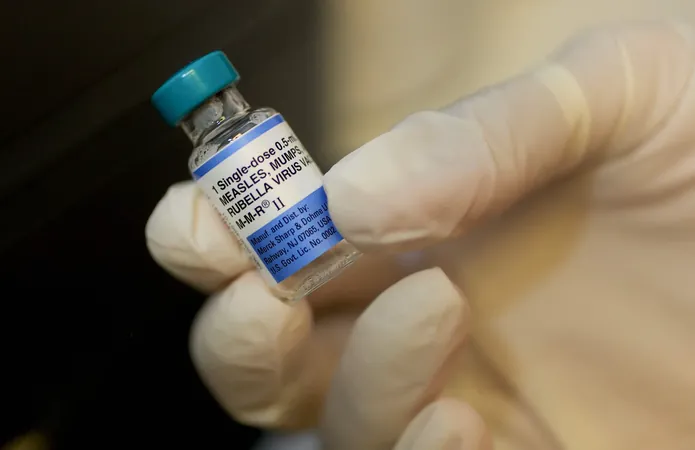
A Spartan Family's Battle Against Brain Cancer: Hope Found at MSU
2025-09-17
Author: Li
In August 2024, Emily Burns experienced troubling changes in her vision. Initially, she sought help from her eye doctor, but as her symptoms worsened, including persistent headaches, she was referred to the emergency room at Corewell Health William Beaumont University Hospital.
Doctors there delivered the shocking diagnosis: a brain tumor. After a week, surgery revealed it was glioblastoma, the most common and aggressive type of brain cancer in adults, which tragically boasts a mere 6.9% five-year survival rate.
"At first, I was a little numb," Emily recalled. "It felt surreal; one moment I was fine, and the next I was facing a life-threatening condition."
A Son's Quest for Answers
As Emily grappled with her diagnosis, her son Will was starting his junior year at Michigan State University. Striving to support his mother, he dedicated his research time to understanding glioblastoma.
"I owe my great life to my mom; there’s no better way to spend my free time than helping her," Will emphasized, embodying the true Spartan spirit.
During his search, Will stumbled upon groundbreaking research led by Dr. Charles "Chaz" Hong from MSU’s College of Human Medicine, who discovered a remarkable compound that could change glioblastoma treatment—funded by the National Institutes of Health.
A Glimmer of Hope: The Science Behind the Cure
Dr. Hong and his team unveiled a protein called GPR68 that helps cancer cells thrive in acidic environments. They identified a compound, Ogremorphin, that targets GPR68, effectively halting cancer cell growth.
"Noncancerous cells are like drivers obeying the speed limit, while cancer cells zoom by with turbo engines. We found a way to target that turbo drive and bring them to a stop," Dr. Hong explained.
Dr. Hong views this research as a potential game-changer, saying that blocking GPR68 could transform glioblastoma from a deadly diagnosis into a manageable condition—a “major medical victory.”
A Personal Connection
Recognizing the potential impact on his mother, Will reached out to Dr. Hong. The doctor graciously invited them to his lab for a firsthand look at his revolutionary work.
"Dr. Hong didn’t have to do any of this, but he went above and beyond for my family. It meant the world to us," Will said, reflecting the supportive community at MSU.
Spartans Supporting Spartans
The bond between the Burns family and Dr. Hong represents more than a patient-practitioner relationship. It’s a heartwarming example of Spartans supporting one another.
Both Emily and her husband, Bill, are proud MSU alumni, and their family has deep roots in the Spartan community. Will’s sister, Jessie, has also joined the MSU ranks, strengthening the family’s legacy.
"It’s incredible that a place we feel so connected to is pioneering research that can potentially save my mom," Will said, embodying the hope of a family united in their battle against cancer.




 Brasil (PT)
Brasil (PT)
 Canada (EN)
Canada (EN)
 Chile (ES)
Chile (ES)
 Česko (CS)
Česko (CS)
 대한민국 (KO)
대한민국 (KO)
 España (ES)
España (ES)
 France (FR)
France (FR)
 Hong Kong (EN)
Hong Kong (EN)
 Italia (IT)
Italia (IT)
 日本 (JA)
日本 (JA)
 Magyarország (HU)
Magyarország (HU)
 Norge (NO)
Norge (NO)
 Polska (PL)
Polska (PL)
 Schweiz (DE)
Schweiz (DE)
 Singapore (EN)
Singapore (EN)
 Sverige (SV)
Sverige (SV)
 Suomi (FI)
Suomi (FI)
 Türkiye (TR)
Türkiye (TR)
 الإمارات العربية المتحدة (AR)
الإمارات العربية المتحدة (AR)